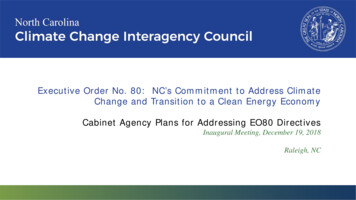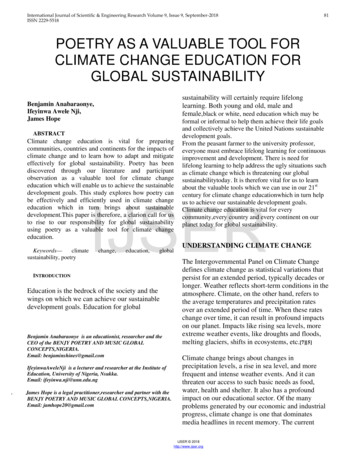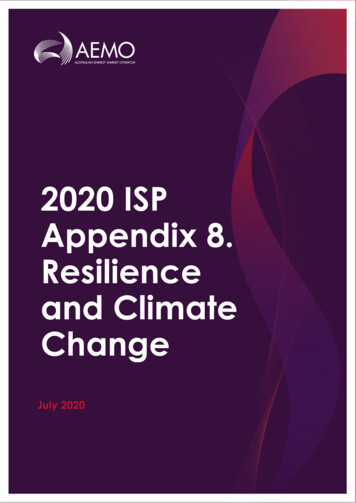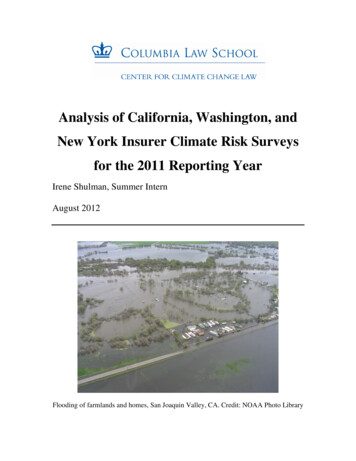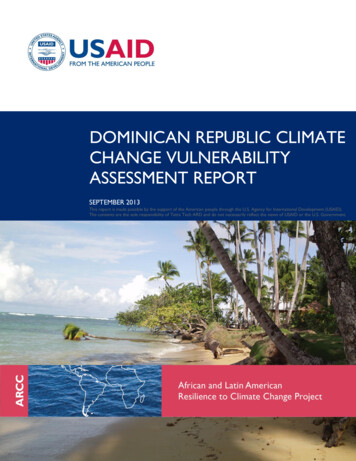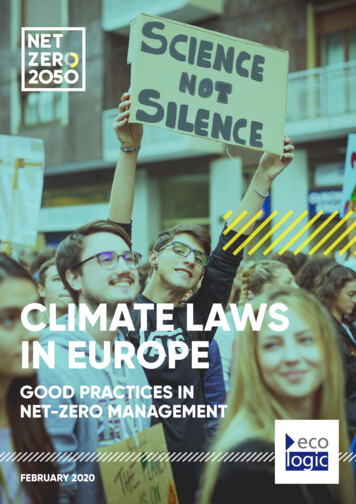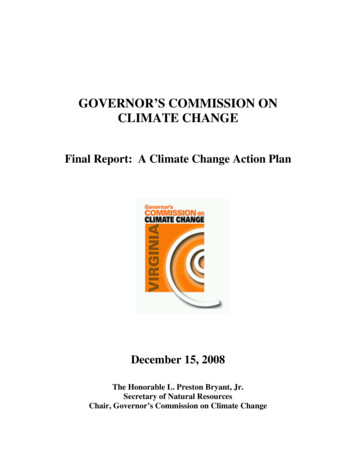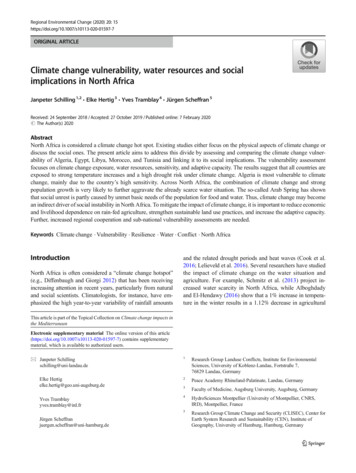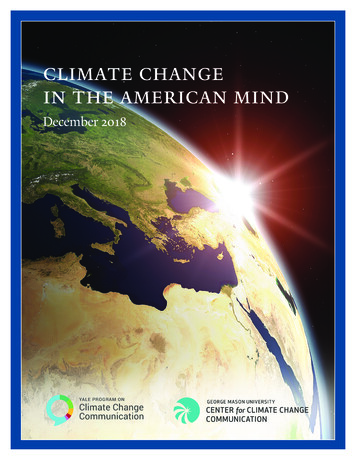
Transcription
climate changein the american mindDecember 2018
Climate Change in the American Mind: December 2018Table of Contents1Introduction . 2Executive Summary. 31.2.3.4.5.Global Warming Beliefs . 5Emotional Responses to Global Warming . 10Perceived Risks of Global Warming . 13Personal and Social Engagement with Global Warming . 16Global Warming and Severe Weather . 21Appendix I: Data Tables . 25Appendix II: Survey Method . 47Appendix III: Sample Demographics . 49
Climate Change in the American Mind: December 20182IntroductionThis report is based on findings from a nationally representative survey – Climate Change in theAmerican Mind – conducted by the Yale Program on Climate Change Communication(climatecommunication.yale.edu) and the George Mason University Center for Climate ChangeCommunication (climatechangecommunication.org). Interview dates: November 28 – December 11,2018. Interviews: 1,114 Adults (18 ). Average margin of error /- 3 percentage points at the 95%confidence level. The research was funded by the 11th Hour Project, the Endeavor Foundation, theEnergy Foundation, the Grantham Foundation, and the MacArthur Foundation.Principal Investigators:Anthony Leiserowitz, PhDYale Program on Climate Change Communicationanthony.leiserowitz@yale.eduEdward Maibach, MPH, PhDGeorge Mason University Center for Climate Change Communicationemaibach@gmu.eduSeth Rosenthal, PhDYale Program on Climate Change Communicationseth.rosenthal@yale.eduJohn Kotcher, PhDGeorge Mason University Center for Climate Change Communicationjkotcher@gmu.eduMatthew Ballew, PhDYale Program on Climate Change Communicationmatthew.ballew@yale.eduMatthew Goldberg, PhDYale Program on Climate Change Communicationmatthew.goldberg@yale.eduAbel Gustafson, PhDYale Program on Climate Change Communicationabel.gustafson@yale.eduCite as:Leiserowitz, A., Maibach, E., Rosenthal, S., Kotcher, J., Ballew, M., Goldberg, M., & Gustafson, A. (2018).Climate change in the American mind: December 2018. Yale University and George Mason University.New Haven, CT: Yale Program on Climate Change Communication.
Climate Change in the American Mind: December 20183Executive SummaryThis report documents a continued upward trend in Americans’ concern about global warming, as reflected inseveral key indicators tracked since 2008, including substantial increases in Americans’ certainty that globalwarming is happening and harming people in the United States now. The proportion of Americans who are veryworried about global warming has more than tripled since its lowest point in 2011. Increasing numbers ofAmericans say they have personally experienced global warming and that the issue is personally important tothem. Notable findings include: Seven in ten Americans (73%) think global warming is happening, an increase of ten percentage pointssince March 2015. Only about one in seven Americans (14%) think global warming is not happening.Americans who think global warming is happening outnumber those who think it isn't by more than a 5to 1 ratio. Americans are also increasingly certain that global warming is happening – 51% are "extremely" or"very" sure it is happening, an increase of 14 percentage points since March 2015, matching the highestlevel since 2008. By contrast, far fewer – 7% – are "extremely" or "very sure" global warming is nothappening. About six in ten Americans (62%) understand that global warming is mostly human-caused. By contrast,about one in four (23%) say it is due mostly to natural changes in the environment. More than half of Americans (57%) understand that most scientists agree that global warming ishappening, the highest level since 2008. However, only one in five (20%) understand how strong thelevel of consensus among scientists is (i.e., that more than 90% of climate scientists have concluded thathuman-caused global warming is happening). About seven in ten Americans (69%) say they are at least "somewhat worried" about global warming.About three in ten (29%) are "very worried" about it – the highest level since our surveys began in 2008. About seven in ten Americans are "interested" in global warming (69%). Majorities also feel "disgusted"(53%) and/or "helpless" (51%). Nearly half are "hopeful" (48%). Few Americans think it's too late to do anything about global warming (14%). Nearly half of Americans (46%) say they have personally experienced the effects of global warming, anincrease of 15 percentage points since March 2015. Nearly half of Americans (48%) think people in the United States are being harmed by global warming"right now." The proportion who believe people are being harmed "right now" has increased by 16percentage points since March 2015 and by nine points since our previous survey in March 2018. About half or more Americans think they (49%), their family (56%), and/or people in their community(57%) will be harmed by global warming. Even more think global warming will harm people in the U.S.(65%), the world's poor (67%), people in developing countries (68%), plant and animal species (74%),and/or future generations of people (75%). About seven in ten Americans (72%) say the issue of global warming is either "extremely," "very," or"somewhat" important to them personally, while only about three in ten (28%) say it is either "not too" or"not at all" personally important. The proportion who say it is personally important has increased by 16percentage points since March 2015, and by nine points since our previous survey in March 2018.
Climate Change in the American Mind: December 20184 About four in ten Americans (41%) say they discuss global warming with family and friends "often" or"occasionally," an increase of 15 percentage points since March 2015. However, more say they "rarely"or "never" discuss it (59%), although this reflects a 15-point decrease since March 2015. More than half of Americans (56%) say they hear about global warming in the media at least once amonth, an increase of 13 percentage points since our previous survey in March 2018. Fewer than half of Americans perceive a social norm in which their friends and family expect them totake action on global warming. Forty-six percent think it is at least moderately important to their familyand friends that they take action (an injunctive norm), and four in ten (40%) say their family and friendsmake at least a moderate effort to reduce global warming (a descriptive norm). About two in three Americans (65%) think global warming is affecting weather in the United States, andthree in ten think weather is being affected "a lot" (32%). About half think global warming made the2018 wildfires in the Western U.S. (50%) and/or hurricanes Florence and Michael (49%) worse. A majority of Americans are worried about harm from extreme events in their local area includingextreme heat (61%), flooding (61%), droughts (58%), and/or water shortages (51%).
Climate Change in the American Mind: December 201851. Global Warming Beliefs1.1. Seven in ten Americans think global warming is happening.Americans who think global warming is happening outnumber those who think it isn’t by more than 5 to 1.About seven in ten Americans (73%) think global warming is happening, the highest percentage since oursurveys began in 2008. By contrast, only about one in seven Americans (14%) think global warming is nothappening.Seven in Ten Americans ThinkGlobal Warming Is HappeningThink global warming is happeningThink global warming is NOT happening100%75%71%57%61% 63% 62%66%70%67%66%63% 62% 64%63%73%70% 70% 70% 71% 70%50%20% 18% 18%25%10%23%16% 14%16%12%19%16%18%15%14% 14%11% 13% 13% 13%0%11/08 1/10 6/10 5/11 11/11 3/12 9/12 4/13 11/13 4/14 10/14 3/15 10/15 3/16 11/16 5/17 10/17 3/18 12/18Do you think global warming is happening?December 2018. Base: Americans 18 .
Climate Change in the American Mind: December 201861.2. Half of Americans are "extremely" or "very" sure global warming is happening. Fewer than one inten are as sure it isn’t happening.Fifty-one percent of Americans are either "extremely" or "very" sure global warming is happening. Far fewer –7% – are "extremely" or "very sure" global warming isn’t happening.The percentage who are sure global warming is happening has risen steadily over the past three years and nowmatches the highest level since our surveys began in 2008.Half of Americans Are “Extremely” or “Very” SureGlobal Warming Is Happening- Certainty that global warming is happening at highest level since 2008 Extremely/Very sure global warming is happeningExtremely/Very sure global warming is NOT happening75%51%50%33% 34% 34% 35% 35%40%37% 36%40% 38%40% 43%37%49% 51%45% 46% 47%25%5%11% 9%9%9%8%5%7%12%8%9%9%8%6%7%7%7%7%7%0%11/08 1/10 6/10 5/11 11/11 3/12 9/12 4/13 11/13 4/14 10/14 3/15 10/15 3/16 11/16 5/17 10/17 3/18 12/18How sure are you that global warming is/is not happening?December 2018. Base: Americans 18 .
Climate Change in the American Mind: December 201871.3. About six in ten Americans think global warming is mostly human-caused.The 2018 U.S. National Climate Assessment (written and reviewed by hundreds of climate experts over thecourse of four years) states: "Greenhouse gas emissions from human activities are the only factors that canaccount for the observed warming over the last century; there are no credible alternative human or naturalexplanations supported by the observational evidence" (pp. 39-40).1A majority of Americans (62%) understand that global warming is mostly human-caused, the highest level sinceour surveys began in 2008. By contrast, about one in four (23%) say it is due mostly to natural changes in theenvironment, the lowest level since our surveys began.About Six in Ten Americans ThinkGlobal Warming Is Mostly Human-CausedThink global warming is caused mostly by human activitiesThink global warming is caused mostly by natural changes in the environment100%75%57%46%50%25%32%50%47% 49% 46%54%49% 47%55%52% 51% 52% 53% 54%58%54%58%37%36%35% 34% 35%33% 33% 32% 33% 34%33%32%32% 33%30% 30%28%62%23%0%11/08 1/10 6/10 5/11 11/11 3/12 9/12 4/13 11/13 4/14 10/14 3/15 10/15 3/16 11/16 5/17 10/17 3/18 12/18Assuming global warming is happening, do you think it is December 2018. Base: Americans 18 .1https://nca2018.globalchange.gov/
Climate Change in the American Mind: December 201881.4. More than half of Americans understand that most scientists agree global warming is happening.A review by John Cook and colleagues2 found that six independent, peer-reviewed studies about the extent ofthe scientific consensus about global warming reached similar conclusions: between 90% and 100% of climatescientists are convinced that human-caused global warming is happening. The most rigorous of these studiesfound that 97% of climate scientists are convinced that human-caused global warming is happening.Now, more than half of Americans (57%) understand most scientists agree that global warming is happening,the highest level since our surveys began in 2008, and a large increase ( 24 percentage points) since the lowestlevel for this response in 2010. By contrast, one in four Americans (25%) think there is a lot of disagreementamong scientists about whether or not global warming is happening, the lowest level since our surveys began.Very few Americans (3%) think most scientists agree that global warming is not happening.More Than Half of Americans Understand ThatMost Scientists Agree Global Warming is HappeningMost scientists think global warming is happeningThere is a lot of disagreement about global warming among scientistsMost scientists think global warming is NOT happening100%75%50%25%46%39%45%33% 33% 34%2%5%4%38% 40% 41%39% 38%4%3%44% 42% 42%44%40%40%34% 36% 33% 33%32% 31% 32%3%3%4%6%5%3%3%51% 49%48%56%50%57%28% 27% 27% 27% 27% 25%3% 3% 3% 2% 2% 3%0%11/08 1/10 6/10 5/11 11/11 3/12 9/12 4/13 11/13 4/14 10/14 3/15 3/16 11/16 5/17 10/17 3/18 12/18What comes closest to your own view?December 2018. Base: Americans 18 .2Cook, J., Oreskes, N., Doran, P. T., Anderegg, W. R. I., Verheggen, B., Maibach, E. W., Carlton, J. S., Lewandowski, S., Skuce, A. G., Green, S.A., Nuccitelli, D., Jacobs, P., Richardson, M., Winkler, B., Painting, R., & Rice., K. (2016). Consensus on consensus: A synthesis of consensusestimates on human-caused global warming. Environmental Research Letters 11(4). doi: 10.1088/1748-9326/11/4/048002
Climate Change in the American Mind: December 201891.5. Only one in five Americans understand that almost all climate scientists (more than 90%) haveconcluded human-caused global warming is happening.Although the majority of Americans now understand that most scientists think global warming is happening,fewer understand just how strong the level of consensus among scientists is. Only one in five Americans (20%)understand that nearly all climate scientists (more than 90%) are convinced that human-caused global warmingis happening, an increase of five percentage points since our previous survey in March 2018. About the sameproportion of Americans (22%) say they "don't know" what percentage of climate scientists think human-causedclimate change is happening, an eight point decrease since March.3Public misunderstanding of the scientific consensus – which has been found in each of our surveys since 2008 –has significant consequences. Other research has identified public understanding of the scientific consensus asan important "gateway belief" that influences other important beliefs (i.e., global warming is happening, humancaused, and worrisome) and support for action.4Only One in Five Americans Understand That Almost AllClimate Scientists (More Than 90%) Have ConcludedHuman-Caused Global Warming Is %-100%DK/Ref.To the best of your knowledge, what percentage of climate scientists think that human-caused global warming ishappening? Please click on the slider bar below to indicate your answer. You can slide the indicator to the position thatbest describes your opinion. If the slider does not work, you can enter a number in the number box.December 2018. Base: Americans 18 (n 1,114).3Respondents were asked to estimate the percentage of climate scientists who have concluded that human-caused global warming is happening bymoving a simulated "slider bar" which appeared on the screen of their computer. This slider allowed respondents to move the marker from "0%" onthe left to "100% on the right, or to any whole number between the two. A "don’t know" response option appeared below the slider bar.4For more information, see: van der Linden, S. L., Leiserowitz, A. A., Feinberg, G. D., & Maibach, E. W. (2015). The scientific consensus onclimate change as a gateway belief: Experimental evidence. PLoS ONE, 10(2). doi: 10.1371/journal.pone.0118489
Climate Change in the American Mind: December 2018102. Emotional Responses to Global Warming2.1. About seven in ten Americans are at least “somewhat worried” about global warming, with aboutthree in ten "very worried."About seven in ten Americans (69%) say they are at least "somewhat worried" about global warming, thehighest level since our surveys began in 2008, and an increase of seven percentage points since our previoussurvey in March 2018. About three in ten Americans (29%) are "very worried," an eight-point increase sinceMarch.About Seven in Ten Americans Are At Least“Somewhat” Worried About Global Warming- About three in ten are “very worried” Very worriedSomewhat 1%41%12%42%9%41%42%12%11%58%51%42%16%53%55% 1/08 1/10 6/10 5/11 11/11 3/12 9/12 4/13 11/13 4/14 10/14 3/15 10/15 3/16 11/16 5/17 10/17 3/18 12/18How worried are you about global warming?December 2018. Base: Americans 18 .
Climate Change in the American Mind: December 2018112.2. About seven in ten Americans are "interested" in global warming, but fewer feel other emotions.When asked how strongly they feel various emotions when they think about global warming, about seven in tenAmericans (69%, 7 percentage points since March 2018) say they feel very or moderately "interested" in it,followed by those who say they feel "disgusted" (53%, 6 points), "helpless" (51%, 6 points), "afraid" (49%, 11 points), "angry" (48%, 9 points), "hopeful" (48%, 7 points), and/or "outraged" (43%, 6 points).About Seven in Ten Americans Are“Interested” In Global Warming- Fewer Feel Other Emotions -VeryInterestedModeratelyNo 5%Hopeful10%Outraged14%0%Not 8%24%136%Not at all34%29%17%27%50%How strongly do you feel each of the following emotions when you think about the issue of global warming?December 2018. Base: Americans 18 (n 1,114).100%
Climate Change in the American Mind: December 201812Emotional reactions to global warming may be felt for different reasons, and signify different meanings,depending on an individual’s beliefs about global warming. For instance, someone who thinks global warmingis happening may feel "disgusted" about it for different reasons than someone who thinks global warming is nothappening. For that reason, we looked separately at people’s emotional reactions to global warming dependingon whether they think it is happening, don’t know whether it is happening, or think it is not happening.About eight in ten (82%) Americans who think global warming is happening say they are very or moderately"interested" in it. Half, or more, feel negative emotions, including "disgusted" (63%), "helpless" (62%), "afraid"(62%), "angry" (58%), and/or "outraged" (54%). About half feel "hopeful" (52%). Conversely, relatively fewAmericans who think global warming isn’t happening feel any emotions about it, the most common being“hopeful” (34%).A Majority of Americans Who Think Global Warming isHappening Feel A Range of EmotionsThink global warming is happening (73%)Don't know if global warming is happening (13%)Think global warming is not happening (14%)100%Percent Who Feel “Very” or “Moderately” AfraidAngryHopefulHow strongly do you feel each of the following emotions when you think about the issue of global warming?December 2018. Base: Americans 18 (n 1,114).Outraged
Climate Change in the American Mind: December 2018133. Perceived Risks of Global Warming3.1. Nearly half of Americans say they have personally experienced the effects of global warming.Nearly half of Americans (46%) say they have personally experienced the effects of global warming, whileslightly more than half (54%) say they have not.The percentage of Americans who say they have personally experienced the effects of global warming hasincreased by five percentage points since our previous survey in March 2018, and is at its highest level since oursurveys began in 2008.Nearly Half of Americans Say They Have PersonallyExperienced The Effects of Global Warming- Up five percentage points since March 2018 -“I have personally experienced the effects of global warming”Agree (strongly/somewhat)Disagree (strongly/somewhat)100%75%66%70% 68%62%57%63% 61% 60% 66% 65%50%32%25%23%29%32%35% 34%38% 39%33% 34%70% 69%60%39%30% 31%64%60%36% 40%56%59%44% 41%54%46%0%11/08 1/10 6/10 5/11 11/11 3/12 9/12 4/13 11/13 4/14 10/14 3/15 3/16 11/16 5/17 10/17 3/18 12/18I have personally experienced the effects of global warming December 2018. Base: Americans 18 .
Climate Change in the American Mind: December 2018143.2. Nearly half of Americans think people in the U.S. are being harmed "right now" by global warming.Nearly half of Americans (48%) think people in the U.S. are being harmed by global warming "right now," thehighest level since our surveys began in 2008, and an increase of nine percentage points since our previoussurvey in March 2018.Nearly Half of Americans Think People in the U.S.Are Being Harmed “Right Now” by Global Warming100%75%48%50%33%25%24%31% 29% 29%28%38% 36%36% 34% 34%35%32% 33% 32% 34%42% 39%0%11/08 1/10 6/10 5/11 11/11 3/12 9/12 4/13 11/13 4/14 10/14 3/15 10/15 3/16 11/16 5/17 10/17 3/18 12/18When do you think global warming will start to harm people ?December 2018. Base: Americans 18 .
Climate Change in the American Mind: December 2018153.3. Nearly half of Americans think they will be harmed by global warming, and they think others will beharmed more.Many Americans understand that global warming will cause harm, and that understanding has increased sinceour previous survey in March 2018. Americans are most likely to think that future generations of people (75%, 4 percentage points since March) and plant and animal species (74%, 3 points) will be harmed a "great deal"or a "moderate amount" by global warming. Majorities also think people in developing countries (68%, 6percentage points since March), the world's poor (67%, 4 points), people in the U.S. (65%, 7 points), peoplein their community (57%, 8 points), and/or their family (56%, 9 points) will be harmed. Nearly half (49%, 7points) think they themselves will be harmed.Nearly Half of Americans Think TheyWill Be Harmed By Global Warming- But think others will be harmed more “Global warming will cause ” a great deal of harm a moderate amount of 7%You personallyYour familyPeople in yourcommunityHow much do you think global warming will harm ?December 2018. Base: Americans 18 (n 1,114).38%67%68%17%20%50%48%People in the The world's poorU.SPeople lspeciesFuturegenerations ofpeople
Climate Change in the American Mind: December 2018164. Personal and Social Engagement with Global Warming4.1. About four in ten Americans say they discuss global warming with family and friends "often" or"occasionally."About four in ten (41%) Americans say they discuss global warming with family and friends at leastoccasionally. Although the majority of Americans (59%) rarely or never discuss global warming with family andfriends, the percentage who do discuss global warming is six points higher than in March 2018, and is at itshighest level since our surveys began in 2008.About Four in Ten Americans Say They Discuss GlobalWarming With Family and Friends “Often” or “Occasionally”“Discuss global warming with family and friends % 74%69% 68% 70% 71% 67%69% 67% 67%68%65%65%64% 64%62%60%59%40%34% 35%30% 30% 29% 29%33%26%32%35%27% 26%31% 33% 33%38%35%41%25%0%11/08 1/10 6/10 5/11 11/11 3/12 9/12 4/13 11/13 4/14 10/14 3/15 10/15 3/16 11/16 5/17 10/17 3/18 12/18How often do you discuss global warming with your family and friends?December 2018. Base: Americans 18 .
Climate Change in the American Mind: December 2018174.2. A majority of Americans hear about global warming in the media at least once a month; about one infour hear people they know talking about it at least once a month.A majority of Americans (56%) say they hear about global warming in the media once a month or morefrequently, an increase of 13 percentage points since our previous survey in March 2018. About one in fourAmericans (27%, a 10-point decrease since March) say they hear about it in the media only several times a yearor less, and 6% say they never hear about it.Only one in four Americans (26%, 6 points) say they hear people they know talking about global warmingonce a month or more. In contrast, 43% say they hear people they know talking about it only several times ayear or less, and about one in five (22%) say they never hear people they know talk about global warming.A Majority of Americans Hear AboutGlobal Warming in the Media at Least Once a Month- One in four hear people they know talking about it at least once a month At least once a weekSeveral times a yearNeverHear about global warming inthe mediaAt least once a monthOnce a year or less oftenNot sure/no answer34%Hear people I know talkingabout global warming9%0%17%22%24%22%19%5% 6%22%50% About how often do you hear about global warming in the media (TV, movies, radio, newspapers/newswebsites, magazines, etc.)? About how often do you hear other people you know (your family, friends, co-workers, etc.) talk aboutglobal warming?December 2018. Base: Americans 18 (n 1,114).10%9%100%
Climate Change in the American Mind: December 2018184.3. The issue of global warming is personally important to about seven in ten Americans.About seven in ten Americans (72%, 9 percentage points since our previous survey in March 2018) say theissue of global warming is either "extremely" (16%, 6 points), "very" (24%, 6 points), or "somewhat" (32%,-3 points) important to them personally, the highest level since our surveys began in 2008. About one in four(28%, -9 points) say global warming is either "not too" (15%) or "not at all" (14%) important personally, thelowest level since our surveys began.The Issue of Global Warming Is PersonallyImportant to About Seven in Ten AmericansExtremely/Very/Somewhat importantNot too/Not at all important100%75%72%70%56%50%42%62% 60%59% 60% 60% 58%63%55%58% 56%62% 61% 61% 63%42% 44%42% 44%38% 38% 39% 38% 40%38% 39% 39% 37%37%29%67%33%63%37%28%25%0%11/08 1/10 6/10 5/11 11/11 3/12 9/12 4/13 11/13 4/14 10/14 3/15 10/15 3/16 11/16 5/17 10/17 3/18 12/18How important is the issue of global warming to you personally?December 2018. Base: Americans 18 .
Climate Change in the American Mind: December 2018194.4. Fewer than half of Americans perceive social norms for taking action on global warming.The belief that people similar or close to you want or expect you to take action to reduce global warming – an"injunctive norm" – and the belief that people similar or close to you are taking action themselves to reduceglobal warming – a "descriptive norm" – can provide motivation to take action oneself.5,6,7,8Fewer than half of Americans (46%) perceive an injunctive norm, saying it is either "extremely" (6%), "very"(13%), or "moderately" important (27%) to their family and friends that they take action to reduce globalwarming. Four in ten Americans (40%) perceive a descriptive norm, saying their family and friends make either"a great deal of effort" (4%), "a lot of effort" (7%), or "a moderate amount of effort" (29%) to reduce globalwarming.Fewer Than Half of Americans PerceiveSocial Norms For Taking Action on Global WarmingImportance to family andfriends (injunctive norm)6%13%27%ExtremelyVeryModeratelyEffort of family and friends(descriptive norm)4% 7%A great deal A lot0%19%Not too18%18%Not at allDon’t know/Ref29%29%16%15%A moderate amountA littleNoneDon’t know/Ref50%100% How important is it to your family and friends that you take action to reduce global warming)? How much of an effort do your family and friends make to reduce global warming?December 2018. Base: Americans 18 (n 1,114).5Ballew, M. T., Goldberg, M. H., Rosenthal, S. A., Cutler, M. J., & Leiserowitz, A. (2019). Climate change activism among Latino and WhiteAmericans. Frontiers in Communication, 3(58), 1-15. doi: 10.3389/fcomm.2018.000586Cialdini, R. B. (2003). Crafting normative messages to protect the environment. Current Directions in Psychological Science, 12(4), 105-109. doi:10.1111/1467-8721.012427Doherty, K. L., & Webler, T. N. (2016). Social norms and efficacy beliefs drive the Alarmed segment's public-sphere climate actions. NatureClimate Change, 6, 879-884. doi: 10.1038/nclimate30258Schultz, P. W., Nolan, J. M., Cialdini, R. B., Goldstein, N. J., & Griskevicius, V. (2007). The constructive, destructive, and reconstructive power ofsocial norms. Psychological Science, 18(5), 429-434. doi: 10.1111/j.1467-9280.2007.01917.x
Climate Change in the American Mind: December 2018204.5. Few Americans think it is too late to do anything about global warming.Only about one in seven Americans (14%) either strongly (2%) or somewhat (12%) agree that it is too late to doanything about global warming. In contrast, two in three Americans (66%) are more optimistic – they eitherstrongly (38%) or somewhat (28%) disagree that it is too late to do anything about global warming.Few Americans Think It IsToo Late To Do Anything About Global WarmingIt’s already too late to do anything about global warmingDon’t know/Refused (20%)Strongly agree (2%)Somewhat agree (12%)Somewhat disagree (28%)Strongly disagree (38%)“It’s already too late to do anything about global warming” [Please indicate how strongly you agree or disagree with thefollowing statement]?December 2018. Base: Americans 18 (n 1,114).
Climate Change in the American Mind: December 2018215. Global Warming and Severe Weather5.1. About two in three Americans think global warming is affecting weather in the United States.About two in three Americans (65%) think global warming is affecting weather in the United States, includingmore than half (58%) w
Climate Change in the American Mind: December 2018 2 Introduction This report is based on findings from a nationally representative survey - Climate Change in the American Mind - conducted by the Yale Program on Climate Change Communication (climatecommunication.yale.edu) and the George Mason University Center for Climate Change


